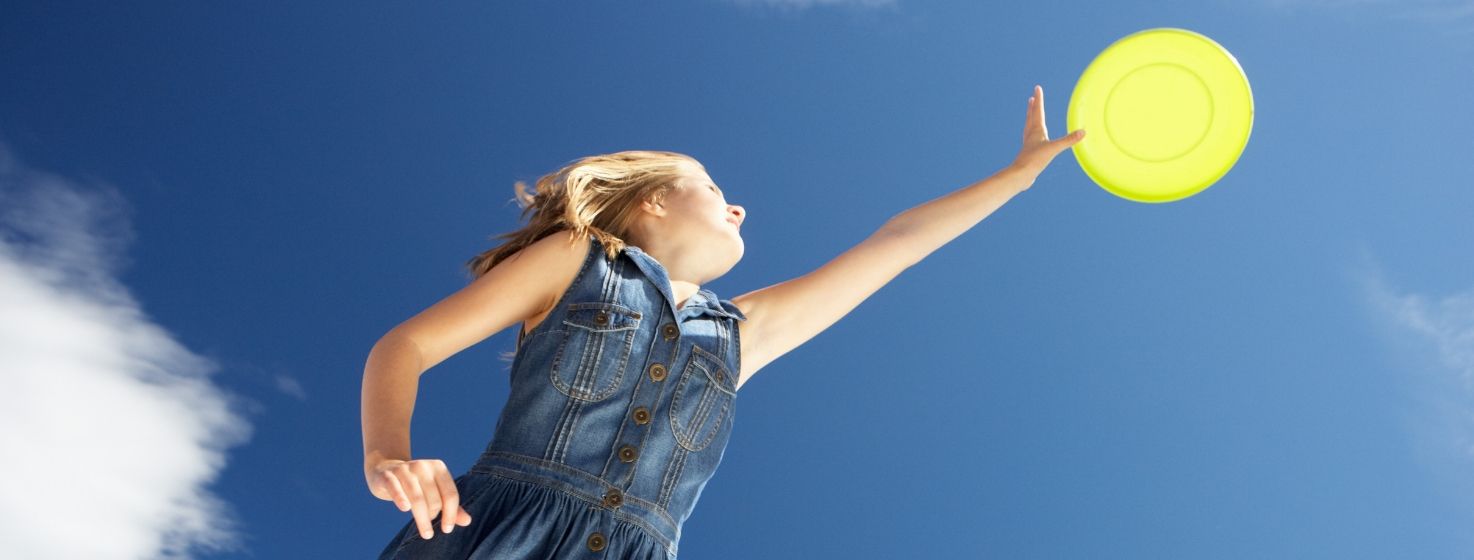…On a Shoestring
Moms, Dads, Get Moving!
By Brian D. Ray, Ph.D.
President
National Home Education Research Institute
Salem, Oregon
For Free homeschool Research News with Dr. Ray, take 17 seconds to sign-up here: https://www.nheri.org/connect/
So you want to have some intense sports activity for your children, but you don’t know where to go or what to do? In some states, interscholastic sports activities are open to homeschool students, but in other states, like West Virginia, they are not. What might a parent do to provide physically challenging, mentally awakening, and spiritually healthy sports activities for their children, including teens (and even younger children)?
About 40 years ago, I bumped into a group of young folks playing a game that I’d never seen before. They were running fast, jumping high, having a blast, smiling, frowning, and going all out. Their enthusiasm really caught my attention. They played on a big field, a little bigger than a football or soccer field, and they threw – accurately, with force, with precision, only 5 yards but sometimes 70 yards—a Frisbee. It was Ultimate. Not Ultimate Frisbee – Ultimate!
It is not “Frisbee Football.” It is not Disc Golf. It is its own sport with its own rules. It is also fast-paced, athletic, and non-contact.
My wife and I took it up and had a blast. We played co-ed. We played men only. We played women only. We ran hard, made a lot of interesting friends, got in better shape, and worked as hard or harder than we had in just about any other sport we had ever played. I had played sports all my life (football, baseball, basketball, soccer, and 4 years of university rowing/crew) but didn’t learn until adulthood that Ultimate is an amazing, challenging, and fun sport. My wife and I watched and played with some of the best athletes we had ever encountered. We learned of rules based on the “honor system.” We met all kinds of people. It was a blast.
Many years later, we were homeschooling our own children in Oregon. Had there been a law allowing our children to participate in “interscholastic activities” (i.e., playing with public and private schools), we would not have been interested. However, the question arose: What might we find for our children that pressed their bodies to something near an extreme physically, was fun, was inexpensive, and might engage a bunch of other homeschoolers and/or their friends? The answer: Ultimate!
It was perfect for moneyless homeschoolers. How many sports can run on four orange cones (or pylons), a soccer/football field, a ten-dollar 175-gram disc, and 7 flags (3-foot strips of bright orange cloth)? That is about $22 in addition to the “free” tax-funded city park’s field or your church’s/friend’s actually-free-to-you field.
You also need two or three parents or teens who are enthusiastic and can offer organizational skills and dependability. Someone needs to read the Ultimate rules and learn and teach the basics to the group. Parents, teens, and even elementary kids (7-year-olds who are taught and practice can often play Ultimate with teens and adults) will need to know the rules, where to meet, how to get in shape, and other basics.
Our group in Salem, Oregon has been at it for roughly 17 years. We are now seeing those who started with us coming back with their children. It’s amazing.
Following is what I tell our players as we start up each year in the spring, the first Tuesday after Daylight Savings Time takes effect. (Yes, we often begin in western Oregon in the rain, mud, and 45-degree weather.)
The Basics
We begin play at 5:30pm on Tuesdays. I have found that Tuesday or Thursday evenings work best for Christian families – not conflicting with Wednesday-night church meetings nor with Saturday family/farm activities. It is very helpful when several players arrive at 5:15pm to help us hold/reserve the field – by spreading out and tossing the disc that they bring. It is usually first come, first serve, on city or public play fields.
We focus on homeschool families, but depending on the circumstances, we might invite others to participate. However, players should ideally be physically prepared. I always push and run them hard. They must run back to the goal line in between scores. If a player can’t because he is too tired, he must get off the field and call for a substitute (sub). Rest/water breaks between games are only 2 to 3 minutes. It is run, run, run during the game. No lollygagging. No socializing.
It is a lot simpler than the rest of this article might make it look. You could simply read Ultimate in 10 Simple Rules to get going and have a great time. If, however, you want to learn from our 20 years of experience, read on!
Physical Prep
I share ideas on how to physically prepare and stay in condition:
- Do calisthenics every day, if you have not been doing so all winter.
- Do some aerobic exercise, if you have not been doing so all winter.
- Stretch your muscles every day.
- Do some mild sprints every other day for a few days, then do some harder ones every other day until your first day on the Ultimate field.
- Continue to do calisthenics and aerobic exercise and some sprints at least two days every week while playing Ultimate on Tuesdays.
Our Ultimate Principles
My main objectives for establishing a regular get-together for playing Ultimate circa 2001 were the following, in no particular order:
1. Fun and good times of fellowship with Christians (generally; some non-Christians play)
2. Intense and competitive athletic exercise, especially for the oldest “children” living in our homes (e.g., teens and “young” adults)
3. Teaching and learning to play a team sport
4. Teaching and learning biblical sportsmanship
5. Teaching and learning leadership on a sport’s field
6. A sporting event open to interaction with non-Christians
7. Sporting activity with solid involvement of some parents and responsible young adults
The principles of our gathering and the Ultimate game we play:
1. Our focus is on good biblical sportsmanship.
2. Another focus is being gracious and kind.
3. We keep the rules relatively simple. (See Ultimate in 10 Simple Rules [url].)
4. The oldest have preference to be on the field. We go by “Ultimate age.” (See below.)
5. We do not have referees (generally speaking). The “older” men are generally the key leaders and peacemakers. And we look to the young adults to pay attention, serve, and lead by example in this capacity.
6. Players politely bring to the attention of the gathering’s leader if something is not in line with the rules and they have never heard an explanation of why.
7. We keep the game moving quickly. No pausing, waiting around with the disc lying on the ground, and so forth.
House Rules
Besides sharing the principles above, I also share these house rules:
- After a foul, very quickly allow the defense to get in order and have the marker (defense) to check or hand the disc to the thrower (offense).
- After a throw out of bounds or a turnover, run up to the line, plant your foot and play; we do not touch the ground with the disc before we throw.
- After a score, jog to your team’s goal line, all the way. If you do not, the person in charge may replace you with another sidelined player.
- If you are too tired to play hard, keep moving, jog back to your goal line after a score, or be cheerful, you must call for a substitute. If you do not think you can make it through a 5-point game after having just played in a game, it is better to rest one game out so that we do not have confusion organizing substitutes.
- Brief breaks (e.g., 2 to 4 minutes between games), but no water breaks during games (unless it’s blistering hot, such as over 90 degrees).
- If there are too many players for one field, we encourage the oldest of the non-players or a parent to start a second game “on the side.” (Regulation is 7 players on a team; we go up to 8, maximum; more than this is far too crowed on a regulation-size field and is very counter-productive.)
- If you have any questions or concerns about our “rules” and the goals of the Ultimate gathering that I have described, please talk to me.
- I would like those who have never played with us before to carefully read Rule #10. It is in the spirit of the golden rule, “So whatever you wish that others would do to you, do also to them, for this is the Law and the Prophets” (Matthew 7:12). In this Ultimate group, we play real hard while we play very respectfully.
- Show respect for all players, regardless of skill or sex. Men/young men are expected to lead in this regard.
- All players are to be humble and look to the older, well-respected, experienced players for direction and instruction on this Ultimate field. Younger players do not wander around telling others how to play and acting as if their knowledge of the sport and winning are more important than playing hard and enjoying and building up one another.
- Coaching in any depth and discussing strategies are kept to the sidelines or during the breaks between games. Team captain, you have 20 seconds or less on the line to say something to your team before the pull (the beginning throw of the disc to start the next play after a score). The team captain may call a time out every now and then during a game to talk with his team for 30 to 45 seconds.
- We play sudden death. The first team to score 5 points wins. No ties, no playoffs, no winning by 2 points.
We like to run hard, play hard, jump hard and high, play well, laugh hard, and encourage hard.
The Honor System
Besides the Ultimate in 10 Simple Rules, where you can read and learn the in-depth rules, we always play on the “honor system.” That is, the person who might have committed or did commit a foul must call it on himself. The person who was or thinks he was fouled may not call a foul on the other person. If a person thinks he is being fouled or thinks a player is rude or fouling. he may go talk with his captain, but he may not call a foul. It is wonderful how this “honor system” works on the spirit, conscience and humility/pride of all players.
Ultimate Age
The oldest players to show up each week have priority over the youngest in terms of playing and being on the field. Plus, we reward those who faithfully attend all games, week after week, and penalize those who just show up whenever they feel like it (e.g., vicissitudes of personality, literally fair-weather players, and so forth). Therefore, we created “Ultimate Age”: if you attended 3 of the last 3 weeks, add one year to your actual age; if you played most weeks last year, add another year to your actual age. For example, if you are 12 and attended 3 of the last 3 weeks and played the majority of weeks last year, then you are 14 years old. We line up, from the leader’s perspective, oldest on his left and youngest on his right along a line on the field. Then the two captains pick teams. If there are not enough fields or the teams are too crowded, the youngest, by “Ultimate age,” do not get to play.
And ultimately…
We have seen significant changes in biblical and godly sportsmanship. We have seen people who really never did any sporting activities come alive. We have had a lot of fun and gotten in great physical condition. Give it a try!
Editor’s note: We were exposed to Ultimate while attending national homeschool leadership conferences – where Brian was asked to coach Ultimate with the young people. Our own teens came away excited about this new game – despite their well-earned exhaustion after. It comes highly recommended by WV homeschoolers who have had a taste of it!





Recent Comments